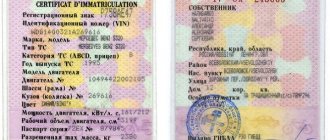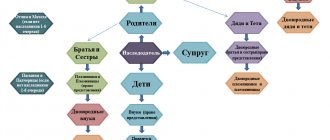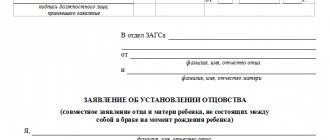The concept of the timing of issuing a certificate of inheritance
In order to obtain an official certificate, you need to contact the notary office at the place where the inheritance was opened with an application. The deadline for filing it is limited to six months from the date of death of the property owner. The package of documents submitted to the notary must include:
- a document certifying the death of the testator;
- a document confirming the existence of an inheritance, its composition and valuation, issued by the relevant organizations;
- the notary determines the value of the shares transferred to the heir, which are subject to property tax and others that the notary will indicate.
According to the Tax Code of the Russian Federation, for issuing a certificate of the right to inheritance, close relatives who accepted the inheritance (children, husband/wife, parents) are required to pay a state duty. It is 0.3% of the value of the inheritance. But its size should not exceed 100 thousand rubles. More distant heirs must pay a state duty of 0.6%. Its size should not exceed 1 million rubles.
If the inheritance is accepted by will, then a document on the right of inheritance by will is issued, if by law, a document on the right of inheritance by law is issued.
It is not necessary to register the document. The successor only puts his signature in the register of notarial acts at the place of acceptance of the inheritance. But in order to use, for example, transport, it is necessary to legalize the rights: register the car.
The certificate has been received, what to do next?
The course of further events depends on the type of property that the heir received. So, for example, ownership of an apartment, house or other premises will need to be registered through Rosreestr at the MFC. Otherwise, subsequent transactions with such objects will be impossible.
Vehicles received as an inheritance are also re-registered to the legal successor through the traffic police department. This should be done within 10 days after registration at the notary office.
If the object of inheritance is money in accounts or deposits, the successor must contact the appropriate bank for re-registration.
When inheriting a share in a business, you need to contact the tax service to register your corporate rights.
Reasons for suspending the issuance of a certificate of inheritance
The time limit for issuing a certificate of inheritance is not limited after six months after the death of the testator. But there are cases when the issuance of documents is suspended:
- if one of the successors refuses the inheritance, then the right of inheritance arises for other persons who have the right of inheritance;
- the period for accepting property for such heirs will be extended by another three months, after the period of six months established by law. Thus, the inheritance can be accepted nine months after its opening;
- if an heir appears who missed the legal deadline for entering into the inheritance, but he filed an application to the court and his rights were restored, and other heirs have already received certificates, then their validity will be terminated;
- the inheritance document will not be issued to other heirs until all the legitimate interests of the heir who missed the inheritance deadline for good reasons are taken into account;
- if there is a statement in court from a successor who disputes the right to inheritance. The issuance of documents is suspended until the court makes a decision. But, if no notification of such a statement is received from the court within ten days, then the issuance of documents will be resumed;
- if the notary requires additional documentary information. There is no complete list of documents required to submit to a notary;
- if the documents provided raise doubts, the notary will send them for examination and until a response is received, the suspension of the issuance of documents is inevitable;
- if there is a fact of fraud or there was an error in the document, then a court decision will make a decision to cancel the document;
- there is a conceived but not yet born heir. If no documents are presented within 300 days of the father's death, paternity will not be confirmed and the documents will be issued;
- if you need to find out from other interested relatives whether they have any objections to the issuance of the document;
- if there are no reasons for suspending the issuance of inheritance documents, then each of the heirs can receive their own certificate of inheritance without waiting for other successors to wish to receive it.
In all these cases, the deadline for issuing a certificate of inheritance can only be postponed for one month from the time the notary issued the suspension order.
Entry into inheritance
The hereditary distribution of material and legal baggage is carried out in various ways. It is conditioned by a will drawn up in advance and entered into force or the absence of one (or not notarized if it is insignificant). It is unacceptable to claim inheritance before the death of the testator, and even more so to protest these processes.
Procedure
The specifics of the implementation of rights depend on the presence or absence of a will. In the first case, after the opening of the inheritance (the death of the testator), the inheritance is distributed among the people specified in the will. Disabled applicants (dependents) may not be taken into account here, who will have to allocate a mandatory share in the future.
Stages of registering an inheritance and exercising rights to it:
- The testator draws up a document with its certification by a notary. At the request of the testator, at this moment there is the right to admit witnesses to certify the actions taking place. The notary enters information about the testamentary act into the EIS register.
- After the death of the testator, the inheritance is opened, and the successors apply to a notary office (usually linked to the testator’s residential address). Here you need to submit an application to the notary about the proposed transfer of property. This is the so-called registration of ownership of the intended inheritance.
- Based on the episode of appeal, an inheritance case is opened, information about which is also transferred to the database (for collecting and processing information specifically on these cases). If after this, secondary appeals are received from other legal successors, then information on a possibly previously opened case is checked. Such declarations of entry into law are attached to it. After this, the notary is obliged to issue a certificate.
- Further, if the named successors have no claims against each other, the division is carried out in accordance with the will of the testator. In another case, as well as when other citizens claiming a share are involved in the process, legal proceedings are initiated (using a claim).
The lawsuits address a variety of life situations and grievances. Plaintiffs have the right to file a petition to revoke all or part of the will, to conduct a division procedure between the named heirs (including those with priority rights) and unaccounted for dependents. Also, this document may be recognized as contested in court due to invalidity due to legal circumstances. Etc.
When participating in legal proceedings, the plaintiff and defendant must provide personal documents and evidence of their position to the court. One of them is the issued certificate of legal guarantees. To claim an inheritance, it is sufficient to mention the name and rights of the heir in the will.
If there is no testamentary disposition, then the division of the inheritance occurs in the legal field. When distributing inheritance, Russian legislation provides for a sequence consisting of seven stages. It is also permissible to include dependents when claiming inheritance.
Required documents
The content of the documentary case depends on the specifics of the situation regarding the distribution of inheritance. The presence of a will is the reason to contact a notary with personal documents and a death certificate, as well as a certificate of the last place of residence of the testator. Based on this portfolio and the application completed in the chamber, they are issued a certificate of legal rights to inheritance.
If there is a will, the successors also have the right to try to initiate legal proceedings, expressing their claims and demands against other applicants (defendants). In this situation, it is necessary to prepare a statement of claim with attachments for the court and the participants in the process.
In the absence of a will, recipients prove the right to appropriate the property of the deceased owner to a notary chamber or court. The second option is relevant if they have any disputes or if it is necessary to take into account the rights of individual relatives (the right to an obligatory part, the preemptive right in the inheritance mass).
For legal proceedings you must provide:
- Copies of the statement according to the number of participants in the debate.
- Passport.
- Certificate of death of the testator (or recognition of him as deceased in court) and his documentary rights to the property that passes to the heir.
- The will itself.
- Perhaps confirmation after the death of the testator of the fact of family ties or other family closeness.
- A certificate of entitlement that has no expiration date.
- Evidence base (varied depending on the issues).
- Payment of mandatory state duty.
Presumptive heirs also have the right to draw up a voluntary agreement on division (1165 of the Civil Code of the Russian Federation). For it to come into force, you must use the services of a notary. You will have to not only think through the contents of the document, but also certify it. The service is paid. Its cost is determined by the legal norms for calculating state duty.
Early issuance of a certificate of inheritance
Early issuance of a certificate of inheritance is possible. This will happen if the notary is provided with all the necessary documents and it is reliably established that there are no other applicants for the property. The second option is a court order to issue the document early.
To the extent that the law does not provide criteria by which data can be recognized as reliable, such an assessment is made by a notary who delves into all specific situations and circumstances. Documentary evidence may include:
- marital status of the testator (marriage certificate);
- relationship of the heirs with the deceased owner of the property;
- documents from the place of work of the deceased testator: an extract from the registration sheet filled out by him. Issued by the human resources department at the place of former work;
- The required document can also be issued by the military registration and enlistment office where the deceased owner was registered with the military.
It is not the notary’s duty to issue a certificate ahead of schedule, but only his right.
Obtaining a certificate of inheritance is the basis for other legal actions in relation to inherited property. This is state registration of property, for example, an apartment or house, securities.
Author of the article
Cases in which it is necessary to obtain a certificate of inheritance
Sometimes heirs cannot fully dispose of (or even use) the property transferred to them as an inheritance. Then they need to issue a certificate in order to proceed with the re-registration of the received property in their name. It is imperative to submit an application for a certificate if the inheritance includes property subject to registration (house, car). Without re-registration, it is impossible to establish a new owner.
Obtaining a certificate is necessary when inheriting a house or other residential premises, land, garage, vehicle, bank deposit, securities and other things.
The document issued for the property subject to registration is also registered.
If the heir does not intend to sell , for example, the house and garden in which he operates, the actual acceptance of the inheritance or an application to the notary for acceptance of the inheritance may well be enough for him.
Invalidation of the certificate
The legality of the issued certificate, like any other legal document, can be challenged. This requires at least one of the following reasons:
- the interests of other heirs were not taken into account when issuing the document;
- registration of inheritance by unworthy heirs in accordance with Art. 1117 Civil Code of the Russian Federation;
- invalidity of the will, established by the court, according to the rules of Art. 1131 Civil Code of the Russian Federation;
- missing the deadline for applying for an inheritance and its subsequent restoration on the basis of Art. 1155 of the Civil Code of the Russian Federation.
Recognition of invalidity can be achieved by filing a claim in court and attaching evidence of the specified facts to it.






